Related Research Articles

Puyi, was the final emperor of China, reigning as the eleventh and final monarch of the Qing dynasty. He was later ruler of the puppet state of Manchukuo under the Empire of Japan from 1934 to 1945. He became emperor at the age of two in 1908, but was forced to abdicate at the age of six in 1912 during the Xinhai Revolution. During his first reign he was known as the Xuantong Emperor, with his era name meaning "proclamation of unity".

Zhang Guotao, or Chang Kuo-tao, was a founding member of the Chinese Communist Party (CCP) and rival to Mao Zedong. During the 1920s he studied in the Soviet Union and became a key contact with the Comintern, organizing the CCP labor movement in the United Front with the Kuomintang. From 1931 to 1932, after the Party had been driven from the cities, Zhang was placed in charge of the Eyuwan Soviet. When his armies were driven from the region, he joined the Long March but lost a contentious struggle for party leadership to Mao Zedong. Zhang's armies then took a different route from Mao's and were badly beaten by local Muslim Ma clique forces in Gansu. When his depleted forces finally arrived to join Mao in Yan'an, Zhang continued his losing challenge to Mao, and left the party in 1938. Zhang eventually retired to Canada, in 1968. He became a Christian shortly before his death in Scarborough, Ontario, in 1979. His memoirs provide valuable and vivid information on his life and party history.

To Live, also titled Lifetimes in some English versions, is a 1994 Chinese drama film directed by Zhang Yimou and written by Lu Wei, based on the novel of the same name by Yu Hua. It was produced by the Shanghai Film Studio and ERA International, starring Ge You and Gong Li, in her seventh collaboration with director Zhang Yimou.

The White-Haired Girl is a Chinese contemporary classical opera by Yan Jinxuan to a Chinese libretto by He Jingzhi and Ding Yi. It was later adapted to a ballet, a Peking opera, and a film. The ballet adaptation was regarded as a revolutionary opera.

Red Sorghum is a 1987 Chinese film about a young woman's life working in a distillery for sorghum liquor. It is based on the first two parts of the novel Red Sorghum by Nobel laureate Mo Yan.

The Blue Kite is a 1993 drama film directed by Tian Zhuangzhuang. Though banned by the Chinese government upon its completion, the film soon found a receptive international audience. Along with Zhang Yimou's To Live and Chen Kaige's Farewell My Concubine, The Blue Kite serves as one of the quintessential examples of China's Fifth Generation filmmaking, and in particular reveals the impact the various political movements, including Anti-Rightist Movement and Cultural Revolution, had upon directors who grew up in the 1950s and 1960s.

Red Cliff or Chibi is a 2008–2009 internationally co-produced epic war film, based on the Battle of Red Cliffs and the events at the end of the Han dynasty and immediately prior to the Three Kingdoms period in Imperial China. The film was directed by John Woo, and stars Tony Leung Chiu-wai, Takeshi Kaneshiro, Zhang Fengyi, Chang Chen, Zhao Wei, Hu Jun, and Lin Chi-ling. It was Woo's first major film since 2003's Paycheck and his first Chinese-language feature since 1992's Hard Boiled, also starring Leung.
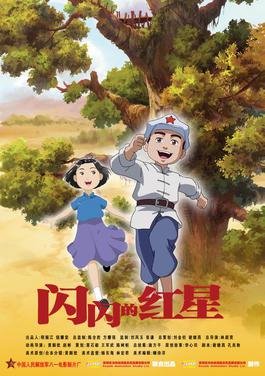
Sparkling Red Star is a 2007 Chinese animated film produced by Puzzle Animation Studio Limited in collaboration with the Bayi Film Studio of the People's Liberation Army. It is an animated remake of the 1974 children's propaganda film Sparkling Red Star, which was made during the Cultural Revolution. The film concerns a boy who helps the Red Army fight a greedy landlord in his village.

Mulan Joins the Army, is a 1939 Chinese historical war film. It is one of several film adaptations of the Hua Mulan legend, which have included two silent versions: Hua Mulan Joins the Army (1927) by Tianyi Film Company, and a less successful Mulan Joins the Army (1928) produced by China Sun Motion Picture Company.

Eva Sandberg was a German photographer who took Soviet citizenship. In Moscow she met and married the Chinese communist poet Xiao San. In 1939, after twelve years in Moscow, Xiao was ordered to the revolutionary base at Yan'an; Sandberg was allowed to accompany him. The conductor Herbert Sandberg was her brother.

Hu Die, also known by her English name Butterfly Wu, was a popular Chinese actress during the 1920s and 1930s. She was voted China's first "Movie Queen" in 1933, and won the Best Actress Award at the 1960 Asian Film Festival for her performance in Rear Door.
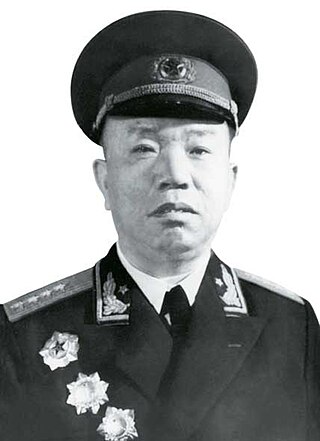
Wang Shusheng, was a Chinese general, strategist, revolutionary and one of the pioneers of Chinese ordnance and military sciences construction. In 1955 Wang became one of the ten Da Jiang of the People's Liberation Army. He was born into a landlord family but became a major leader of the peasant movement. He experienced many significant battles during the China's turbulent years such as the Second Sino-Japanese War and the Chinese Civil War.
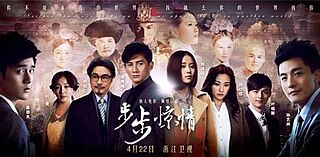
Scarlet Heart 2 is a 2014 Chinese television series. It is the sequel to Scarlet Heart (2011), and continues the story after the time traveling protagonist, Zhang Xiao, returns to her own time following the death of Ma'ertai Ruoxi. The story is not considered to be canon to Tong Hua's novel Bu Bu Jing Xin because the author never wrote a sequel, although some of the cast members from the first series have returned. Unlike its predecessor, the series does not involve time traveling and is set in the present, resolving the loose ends left by the first series' cliffhanger.
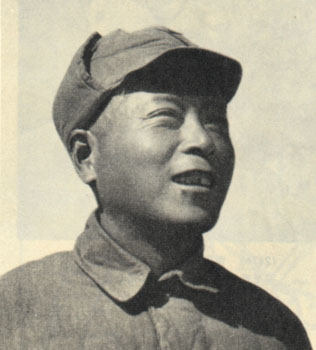
Li Jingquan was a Chinese politician and the first Party Committee Secretary (governor) of Sichuan following the establishment of the People's Republic of China in 1949. He supported many of Mao Zedong's policies including the Great Leap Forward.

Battle of Changsha is a 2014 Chinese television series produced by Hou Hongliang and directed by Kong Sheng. The story is set against the backdrop of the Battle of Changsha in 1939 during World War II. Starring Wallace Huo and Yang Zi, the series premiered on CCTV-8 on 14 July ended its run on 31 July 2014.
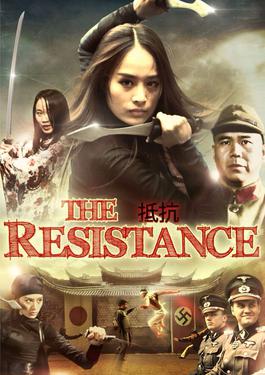
The Resistance is a Chinese martial arts action film set during World War II, directed by Peng Zhang Li.
Xiao Han, probably born with the name Shulü Han (述律翰), also named Dilie (敵烈), courtesy name Hanzhen (寒真), was a general of the Khitan-led Liao dynasty of China. After Emperor Taizong of Liao conquered the Later Jin, Xiao was left in control of the Later Jin's former capital Daliang, but he was unable to hold it. He later plotted against Emperor Taizong's nephew and successor Emperor Shizong and was executed.
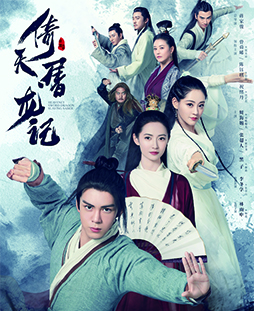
Heavenly Sword and Dragon Slaying Sabre is a 2019 Chinese wuxia television series adapted from the novel The Heaven Sword and Dragon Saber by Jin Yong. Originally published in newspapers from 1961 to 1963, the story has been revised twice; once in 1979 and the second in 2005. This remake is primarily based on the third edition of the novel and also being promoted as a rework to the 1994 adaptation. The series is the first adaptation to be released as a web series and was first broadcast on Tencent in China on February 27, 2019.

The Glory of Youth is the first Chinese Army Rocket Force television series based on Feng Jie's novel Graduated, Being A Soldier developed by The Chinese People's Liberation Army Rocket Force, Starring Li Yifeng, Chen Xingxu, Zhang Xinyu and Xiao Yang. It aired on Zhejiang TV, Jiangsu TV and Youku from 13 April to 11 May 2021. And a special edited version aired on Youku on May 20, 2021
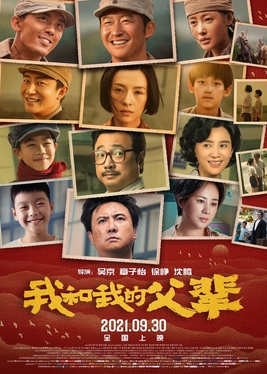
My Country, My Parents is a 2021 Chinese three-part anthology drama film, consisting of four segments directed by four directors, Wu Jing, Zhang Ziyi, Xu Zheng, and Shen Teng. The four directors also star in their own stories, each covering a different genre and taking place in different periods from the Second Sino-Japanese War in 1942 to a futuristic world in 2050. The film became the third installment in a series that celebrates the founding of the People's Republic of China on 1 October 1949, with two prequels, My People, My Country and My People, My Homeland, released in 2019 and 2020, respectively. The film was released in China on September 30, 2021, to commemorate the 72nd anniversary of the establishment of the People's Republic of China.
References
- Zhang, Yingjin & Xiao, Zhiwei. Encyclopedia of Chinese Film. Taylor & Francis (1998). ISBN 0-415-15168-6.